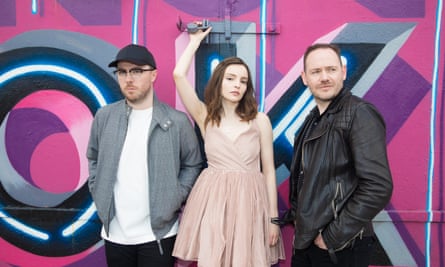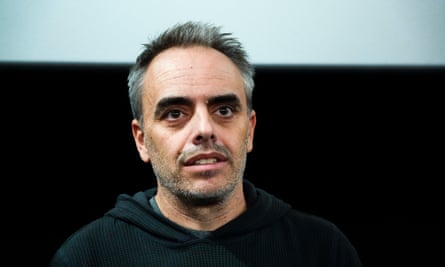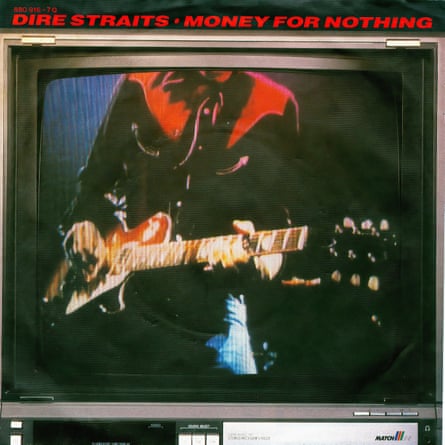A graphic novel company recently sent Lauren Mayberry a pitch asking if they could use her likeness. The comic was to be set in a post-apocalyptic Scotland (Mayberry is from Glasgow and was born in Stirling) and it featured Lauren, feminist firebrand, as one of a group of women who, Handmaid’s Tale-style, had been imprisoned, repeatedly raped and inseminated by the planet’s remaining men. Lauren was going to free all the women, and then take them to the Highlands – where they’d start a revolution!
Mayberry, desensitised to this geek version of what she calls “men’s feminism”, sent a polite reply, saying that tonally it was a little odd, and could they possibly explore some alternative ideas. The pitch was not unusual: the difference, these days, was that it came via her female manager with a “not sure about this one” attached, and she didn’t have to explain to any men why she turned it down.
Mayberry sits in the garden room of a very trendy Hackney hotel at 10am on a Sunday: the same hotel where, 10 years ago, she had a night out with her hugely successful band, Chvrches, got a bit drunk and wrote an angry column for the Guardian entitled “I will not accept online misogyny”. Mayberry, who is on the cusp of a new solo career, talks softly and rapidly, with a raised eyebrow and a lot of dramatised little voices. She is good at characterising her former self, who fought around the issues of #MeToo five years before it became a movement. Last year she played a series of gigs with her new all-female backing band. Her front of house engineer, Paul Gallagher, also Chvrches’ FOH engineer, would mention if she’d played a particular venue before: “I’d say, I’ve never been here, Paul. Then I’d Google it, and there’s tiny, miserable-looking me from 2012.”
Less miserable at 36, Mayberry is in London for fashion week when we meet – the latest step in her tentative journey from lead singer in a mostly-male indie band to a more performative, dramatic self. When cerebral synth-pop trio Chvrches went viral in 2013 with the song The Mother We Share and went on to release four UK Top 10 albums, Mayberry became an accidental object lesson in women’s experience of the music industry at the height of Twitter. She got online abuse of a peculiarly possessive kind, ranging from accusations of hypocrisy if, as a feminist, she wore a very short skirt on stage, to rape and death threats; as a former journalist and law graduate, she could not help but broadcast and respond to it all, which made the trolls angrier.
“I was fixated with death,” she blinks. “You have that, when people tell you online that they’re going to kill you. It’s not normal to think about death and rape that much! It’s not good for your brain. Why is all the last Chvrches album obsessed with dying? [Screen Violence was full of horror film imagery.] It’s an odd, existential grapple. So, maybe less internet for me, and more trying to live in reality?”
Reality is a tabby cat back home in Los Angeles with a bout of diarrhoea. Mayberry lives in north-east LA (“I visit the madness, but I do not live in the madness”), not too far from Silver Lake, which was once home to Moby’s vegan restaurant, now closed (“Well, maybe he shouldn’t have cracked on to an 18-year-old Natalie Portman!”). Her boyfriend has just called – it is 2am there – concerned about the pet’s diarrhoea, and asking her what to do. He is Sam Stewart, son of Dave Stewart, and they met when Chvrches were touring with his band Lo Moon in 2018. “He moved to LA when he was in his 20s,” Mayberry reflects. “He definitely has a good British, indie-boy, scrappy sensibility that you don’t get if you’ve grown up fully in LA. He’s a very pragmatic, kind, level-headed person, which I think is very helpful…”
It was Dave Stewart who told Mayberry, in 2017, that she was like Joan of Arc. He held her back after a songwriting session for Chvrches’ third album, and, sipping his 6pm martini, showed her a clip of Milla Jovovich giving a rousing speech in the 1999 film about the French martyr. “You could be that, but you don’t want to be,” he said, or words to that effect: “I can see it in the interviews, I can see it in the performances, you want to be this thing, but you’re not giving it 100%.”

It was, from the outside, completely inevitable that she would go solo (though Chvrches have not broken up, as she points out repeatedly: this is merely a hiatus). She seemed so different from her apparently laid-back bandmates Martin Doherty and Iain Cook: shouldering the media attention, writing the manifestos, holding the loudhailer. That self-possession, she says, was an illusion.
“I was a 24-year-old girl who had never worked in entertainment,” she says. “Martin and Iain had been in successful bands [Julia Thirteen and Aereogramme]. I’d paid money for a ticket to see them, and they knew what they were doing. They were a bit older than me, and I was playing a character. I wanted to be good enough to be in this zone with them, and I wanted to be smart. They felt like I was teaching them, but I didn’t know what the fuck I was doing.”
I last met Mayberry in Brooklyn five years ago, shortly after the Dave Stewart pep talk, for an interview about the band breaking the US. At the photoshoot, she stubbornly refused to be photographed on her own – the awkward demand of any woman in a band of men (she eventually stopped trying). We had a drink, and above the bar hung a novelty surfboard on which had been printed the famous pap shot of Britney Spears, angry and shaven-headed, mid breakdown. Mayberry was upset by it. “Don’t like that,” she murmured. “Don’t like that at all.”
“I feel like a lot of my work-life has been having to explain my thoughts or feelings to men,” she continues. “I have been in a lot of rooms with a lot of men in the past 12 years and I feel like a silent observer. My mind is doing two different things; I’m in the room being part of it, but I’m also trying to figure out how to get to my end point. There is so much navigating of male emotion. I can code switch pretty easily, but I don’t feel like any producers or crew guys we’ve worked with have to switch into my universe in the same way.”
Mayberry is still close to Cook and Doherty, but she came to notice how her personal music tastes were hidden in service of the band. “It’s a double life,” she says. “Who I am in the front of the tour bus is very different from who I am inside my headphones. With the films we watched, the music we listened to, I would put on a record that I know everyone would like. That’s how my brain has been socialised. I remember putting on a Yeah Yeah Yeahs CD at a house party at the end of high school, and dudes just ripping the piss out of it. From then on, it’s in the bedroom only. Sometimes I wonder how my brain would have developed if I’d spent more time around other women at that pretty formative time.”
Her new band features Madi Vogt on drums, Heather Nation on guitar and bass, and Renny Goh on keyboards. On tour last year, she walked on stage to Liza Minnelli’s Maybe This Time; she wore knee-high boots and lace tutus and had the words “Sorry Etc”, the title of a new song, eyelinered on her cheek (“I sold my soul to be one of the boys”). The album, as yet unnamed, will be released later this year: the three songs so far released are more pure pop than Chvrches, less icy and more colourful, though often 80s-influenced. The material was inspired by all the things Mayberry held back from her band on the assumption they wouldn’t “fit”: she saved lyrics, filled Pinterest boards with cabaret and performance art imagery, listened to the girl bands of her youth. “I love that performance art stuff that makes you feel separated from your normal self.”
There’s a song called Shame on the new album: “My favourite personal handbag to carry around,” she says. It was inspired by previous relationships, and the kind of men that she feels were branded into the romantic consciousness of girls who were teenagers in the early 2000s. Her romantic hero in those days was Troy, the character played by Ethan Hawke in 1994’s Reality Bites: “This floppy-haired guy who wears flannel and leather jackets and he’s in a band, and nobody understands Troy like she does…” Troy, or the self-involved man-musician, has haunted her life.
“Even when I watch the film now, I’m still horny, it’s still hot – but he’s incredibly rude and dismissive!” she says. “There’s a reason why Matty Healy is all over my TikTok algorithm, and everyone’s favourite Alex Turner persona is the era where he’s acting like a very cool arsehole. I’m hardwired to find that attractive. What I came to enjoy in men, there’s a built-in humiliation in a lot of that. I wasn’t conscious that it was a thing I chased. But I looked for it in nearly every relationship I’ve been in until now. ‘If only I try harder, or be kinder…’ There’s so much bending over backwards to keep somebody’s love. I thought that was just what dating men was like!”
Bands may not fascinate people the way they used to – “Obviously there will be no Take That-style helpline for us,” Mayberry says, “I’m not delusional” – but there’ll be plenty of Chvrches fans worried that this is it for the group. In the past, Mayberry’s reluctance to be photographed without her bandmates was emotional as well as political: “I didn’t want the guys to not like me!” Her hesitation about solo material came from the same fear of rocking the boat. She told them long before there was any music to speak of.
“I had spoken to Iain about it socially before we had a management/band it’s-on-the-agenda Zoom call about it,” she says. “I was conscious of wanting to tell them early in the process, so no one felt blindsided if it did actually turn into something.”
after newsletter promotion
Does she think it will?
“It feels like the industry is more open-minded now, but it still is what it is. I definitely was in the bunk on the bus at 2am Googling: ‘How old is Gwen Stefani?’”
When I last saw Mayberry, she admits today, she was lost. It looked, from the outside, like Chvrches had made it: the first time they toured the States they were sharing one room in Super 8 motels. By 2017 they were living in New York. But she was only there because Glasgow felt too small with the band’s growing fame. “Everybody in Glasgow was always really lovely about it, but in hindsight, I thought, you were having a mental health episode! I just wanted to hang out with my mates like it was 2011.”
She stuck out the US through Brexit, Trump and Covid. Her first solo single, released last year, was a ballad called Are You Awake?, co-written with Tobias Jesso Jr, who has worked with Adele and Harry Styles; a stylistic U-turn – the kind of song she had not written, at the piano, since her “sad teenage writing days” – it talks about transatlantic time differences, and missing weddings, babies and the town where, as she puts it, “all my proper, proper pals are”.
“Sometimes I think, ‘What a fun and thrilling and exciting experience this is’,” she says. “Then the next day I think, ‘You are a stupid fucking woman to think you can do this. It’s going to be so deeply humiliating, you’ve spent so much time doing this and you live 1,000 miles away from everybody you like. Why?’”
When Mayberry uses voice search to find TV shows, she has to switch from Glaswegian to the Queen’s English (“Ssssuuuccession!”) or the software won’t understand her. She recently had a vocal trainer in LA who tried to get rid of her Scottish inflection: she didn’t say anything at the time, but she didn’t go back. She started out as a drummer, and only ever saw her high, pure voice as something “utilitarian, like an instrument”, designed to blend with others: “I used to watch Gabrielle on Top of the Pops and dream of being one of the backing singers.”
There has always been a tension between her frontwoman tendencies – the Joan of Arc part – and the voice that analyses why anyone would want be at the front of a stage, and what it should look like. A new song, the extremely catchy Change Shapes, makes reference to “performative hypocrisy” – a very Mayberrian phrase.
“I’m very lucky that people associate Chvrches with certain politics,” she says, “but how people actually live versus what they present to you, I struggle with that. The public persona of me in the band is for the girls and the gays. ‘Onstage me’ is pretending I don’t take shit from anybody. But then I think, I took a lot of shit today, to be honest…”
She used to feel it was a pop star’s duty to say what they thought, but she has become less overtly political – I can’t get her on to Trump for love nor money, though she used to badmouth him at gigs and got a lot of heckling as a result. She won’t talk about Scottish politics – she just says that she recently spoke to someone in LA who swore the country was already independent. She doesn’t want to write columns any more, suggesting they were the product of booze and late-night emotion.
“I used to believe that saying something on the internet would make a difference and I could change things, and I don’t know if it ever did,” she says. “These days, I know the causes I support, the places I donate. Put your money where your mouth is, don’t be an asshole, align yourself with the right things.”
These days, she says, managers would look out for young artists trying to fight their corner on the internet. “If I could go back, I’d say, somebody else should be in charge of it, not me. They always say, ‘she calls out’ or ‘she takes a stand’. But for the most part, it’s just women asking to be left alone.”
Source: theguardian.com





















